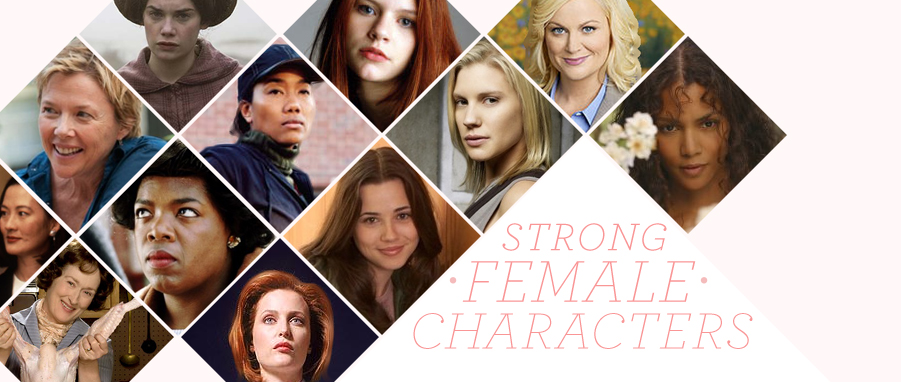It only happened a few years ago, and it may be apocryphal, but the legend goes that when Buffy creator and The Avengers writer-director Joss Whedon was asked by a journalist why he wrote “strong female characters,” he replied, “Because you’re still asking me that question.” I love this quote. I love how it represents both a rejection of what’s a somewhat limiting term---what the heck is a “strong female character” anyway?---and an acknowledgement that despite its limitations we, as women and feminists and feminist-allies, still need to be aware of its existence. Because, it would seem, we don’t have enough in movies, television, advertising, and the media in general.
But what constitutes a “strong female character”? Does she have to be a black belt, have muscles, or carry a machine gun? Does she need magical superhero powers? Does she have to wear pantsuits? Does she have to be an emotional rock that never cries?
I don’t necessarily have an answer, which is part of why I wanted to write this column: to foster a discussion about how women are represented in our culture, and what implications those representations have for our everyday reality. But, if I had to define what a female character, ideally, should be, I would lean towards: real. Or at least as real as fiction ever gets. For me, any character who is not one-dimensional or a stereotype is a strong female character, if I can co-opt an already-overused term.
(Note: This 2011 piece by Carina Chocano sums up pretty well my approach to the “strong female character” phenomenon. Definitely worth a read.)
Case in point: Whedon’s own “Buffy the Vampire Slayer.” (My first Equals Record piece and I’m already revealing my nerdiness: this was and is my favorite show of all time.) Buffy Summers, played by Sarah Michelle Gellar is the Slayer, a hero whose calling in life is to fight the forces of evil using her superhuman strength and agility. She does backflips, knows martial arts, and dusts vampires, demons, and apocalyptic monsters on a regular basis. She saves the world several times. She carries a successful seven-season self-titled TV series. If anyone should be the poster woman for the “strong female character,” it’s Buffy.
But upon closer examination, it isn’t just the fact that she kicks ass that makes her strong. Otherwise, Lara Croft would also be a poster woman SFC (which, to my mind, she most certainly isn’t). Throughout the series, Buffy faces tough situations of rather more earthly sorts: bad relationships, family dysfunction, problems with authority. Her choices are not always the right ones. She cries. She flips out. She does all these very human things, all the while continuing to fight for what she believes is right and remaining relatable to decidedly non-superhuman viewers, male and female. This—and not her ability to wield a wooden stake-- is what makes her strong.
Thus, a female character shouldn’t need to possess traits we consider “masculine” to be an SFC. She doesn’t need to be physically or supernaturally strong and kick male and monster ass, like Buffy or The Avengers' Black Widow. In my humble opinion, what we need more of in pop culture are not female superheroes, so much as female characters, period (FCs?): in a variety of roles, shown in a variety of lights, a variety of shapes, sizes, colors, orientations, and occupations, a variety of choices, a variety of voices.
As with minorities in general, a major reason this doesn’t happen as often as it should is because our centers of cultural production (e.g. Hollywood) remain dominated by white, normative males, who are both more inclined to represent their own kind and perhaps less suited to represent others with accuracy and nuance. So goes the country. But things are getting better. I think. I’m trying to be optimistic.
I embark on the adventure of this column with two goals in mind: first, to critically examine the way popular culture represents women, and other minorities, and address when it’s done right, and, especially, when it’s done wrong---because while complaining might not do much, it’s better than passive acceptance of tired old tropes.
And second, perhaps less nobly: to have fun gossiping about TV shows and movies! I've said it once and I'll say it again: I’m the type of girl who publicly hates on pop culture, particularly things like trashy reality television and entertainment magazines and celebrity fashion, while secretly enjoying them whenever I need a little escapism from, you know, life. What can I say? I’m a pop culture junkie. I am not going to lie, as I type this the Kardashians are on my TV set. I’m only a little ashamed to admit this.
So please join me as I dive into the good, the bad, the ugly and the pretty of pop culture, from positive role models to shameful stereotypes, from sexual empowerment to sexual objectification. Maybe I’m an idealist, but I believe that we give pop culture its power, and we can take it away---so if we stop accepting “the bad” and “the ugly” at face value and examine what’s underneath, maybe we can demand, and receive, more of “the good” and the “pretty”---whatever those may be.


